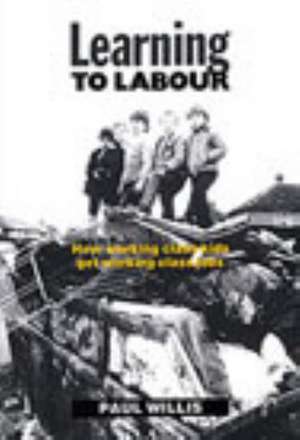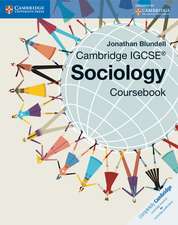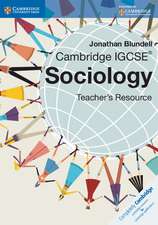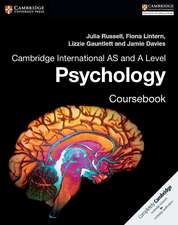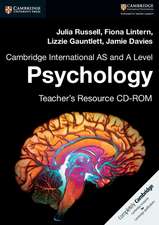Learning to Labour: How Working Class Kids Get Working Class Jobs
Autor Paul Willisen Limba Engleză Paperback – 30 apr 1978
Preț: 294.24 lei
Nou
Puncte Express: 441
Preț estimativ în valută:
56.31€ • 58.57$ • 46.49£
56.31€ • 58.57$ • 46.49£
Carte disponibilă
Livrare economică 24 martie-07 aprilie
Livrare express 07-13 martie pentru 25.01 lei
Preluare comenzi: 021 569.72.76
Specificații
ISBN-13: 9781857421705
ISBN-10: 1857421701
Pagini: 215
Dimensiuni: 138 x 216 x 17 mm
Greutate: 0.25 kg
Ediția:Rev ed
Editura: Taylor & Francis
Colecția Routledge
Locul publicării:Oxford, United Kingdom
ISBN-10: 1857421701
Pagini: 215
Dimensiuni: 138 x 216 x 17 mm
Greutate: 0.25 kg
Ediția:Rev ed
Editura: Taylor & Francis
Colecția Routledge
Locul publicării:Oxford, United Kingdom
Cuprins
Key to transcripts; Introduction. Part I Ethnography: Elements of a culture; Class and institutional form of a culture; Labour power, culture, class and institution. Part II Analysis: Penetrations; Limitations; The role of ideology; Notes towards a theory of cultural forms and social reproduction; Monday morning and the millennium. Index.
Descriere
Suitable for 2nd and 3rd year students taking courses on drug use/misuse principally in departments such as Sociology, Law, Cultural and Media Studies, and Psychology. Also particularly relevant for students taking courses leading to a profession, such as nurses and social workers. The use of illegal drugs is widespread in many societies. Within many western societies particular concern has been focused on the nature and extent of illegal drug use amongst young people. In much of the media coverage an impression is often conveyed that the use of illegal drugs other than cannabis is a one way street leading inevitably to addiction, destitution, family breakdown and death. This impression fails to grasp the fact that most drug users do not become addicts and most addicts do not die. The perception of addiction as a fixed end point characterised by personal and social dissolution fails to recognise that many dependent drug users, even after a period of prolonged dependent drug use, nevertheless still manage to overcome their dependence upon illegal drugs. This process of recovery, either with or without the assistance of helping agencies, has been variously described by researchers, drug counsellors, clinicians and others.
